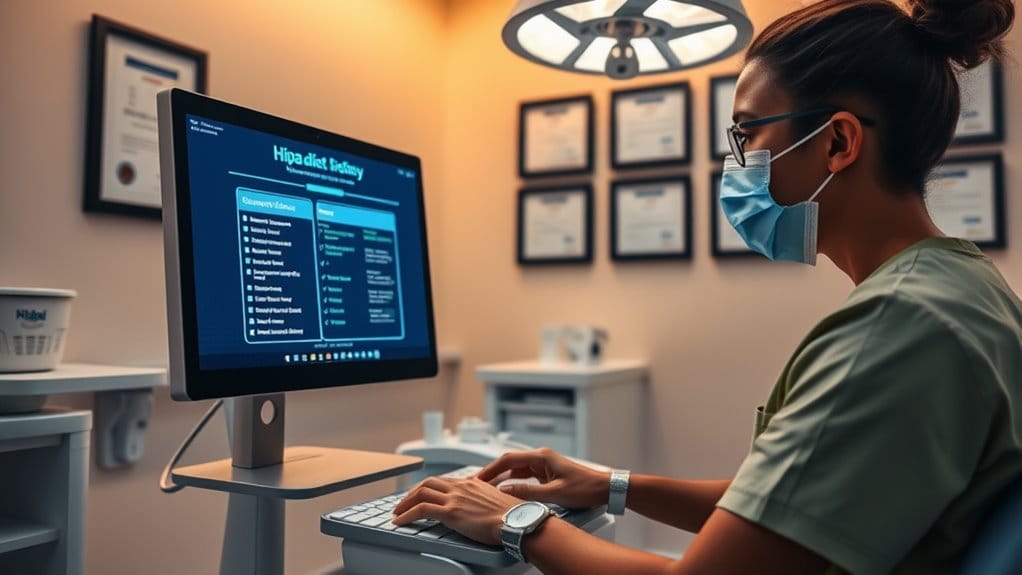What Dental Software Ensures HIPAA Compliance Today?
If you think every dental software on the market guarantees HIPAA compliance, you're in for a surprise. Navigating the landscape of HIPAA regulations can be challenging, especially when it comes to protecting patient data. You'll need to identify which software not only promises security but actually delivers it through features like data encryption and access controls. What sets the most reliable options apart, and how can you ensure your practice stays compliant? Let's explore the critical elements that truly matter in safeguarding electronic Protected Health Information (ePHI).
If you need assistance with achieving HIPAA compliance in your dental practice, feel free to reach out to us. We can connect you with experts who can provide tailored solutions to meet your needs.
Importance of HIPAA Compliance
Understanding the importance of HIPAA compliance is essential for any healthcare organization aiming to protect patient information. Compliance safeguards patient privacy and confidentiality, ensuring that their health information remains secure while granting them control over its use and disclosure. By adhering to HIPAA regulations, you greatly reduce the risk of unauthorized access to Protected Health Information (PHI), which is critical for maintaining patient trust.
Moreover, compliance acts as a shield against legal penalties that can arise from privacy breaches. Healthcare organizations face serious financial repercussions for violations, with fines ranging from thousands to millions of dollars. A notable example is Anthem Inc., which paid $16 million for a data breach in 2015, highlighting the potential costs of non-compliance. This underscores the importance of the Security Rule, which specifically focuses on safeguarding electronic Protected Health Information (ePHI).
Ensuring robust security measures not only protects against data breaches but also enhances operational efficiency. By implementing standardized HIPAA processes, you can streamline administrative workflows and minimize the risk of reputational damage due to violations.
Ultimately, prioritizing HIPAA compliance is essential for fostering trust, protecting sensitive information, and avoiding legal repercussions in your pursuit of serving others effectively.
Key Features of Dental Software
Implementing dental software that prioritizes HIPAA compliance is fundamental for safeguarding patient information while enhancing practice efficiency. Key features of such software greatly improve user experience and guarantee data accessibility, imperative in today's digital landscape.
Data security is paramount. Look for software that offers robust encryption, protecting patient data both in transit and at rest. Access controls are essential, allowing you to set strict permissions, guaranteeing only authorized personnel can access sensitive information. Additionally, comprehensive audit logs provide a detailed account of who accesses data and any changes made, which is crucial for compliance.
Operational efficiency is improved through automated workflows, reducing human error in tasks like appointment confirmations and billing. An integrated billing system streamlines financial management, while a patient portal empowers patients, allowing them to book appointments and access records securely.
Regular software updates keep your practice aligned with the latest HIPAA regulations and security best practices. Backup and data recovery mechanisms are critical, ensuring you can quickly recover from any data loss incidents.
Identalsoft Overview
When evaluating dental software, Identalsoft stands out due to its extensive capabilities designed to streamline practice management while guaranteeing HIPAA compliance. One of the key Identalsoft features is its thorough management of dental charting, patient scheduling, communication, reminders, and billing. This integration not only enhances efficiency but also safeguards patient data, including health information and treatment records.
The Identalsoft benefits extend to its robust security measures. By offering a Business Associate Agreement (BAA) and employing technical safeguards such as data encryption both in transit and at rest, it aligns with HIPAA's stringent requirements. Access controls with unique user identification and audit trails further enhance security, guaranteeing that patient information is protected. Additionally, Identalsoft ensures that it remains compliant with the necessary safeguards required by HIPAA to effectively manage patient data.
Additionally, Identalsoft supports ongoing compliance through regular software updates and training resources for staff on HIPAA regulations. This commitment to continuous improvement means you're well-equipped to handle any changes in regulatory standards.
With physical safeguards and a dedicated incident response plan, Identalsoft guarantees not only compliance but also a secure environment for your patients, allowing you to focus on delivering quality care.
Curve Dental Capabilities
Curve Dental offers a detailed suite of capabilities tailored for modern dental practices, emphasizing both efficiency and regulatory compliance. One of the standout software benefits is its built-in security features, which encrypt patient data in transit and at rest using robust 256-bit SSL encryption.
Access controls guarantee that only authorized personnel can access sensitive information, while extensive audit logs track access and changes to patient data, reinforcing accountability. Furthermore, the continuous evolution of biomedical discoveries ensures that dental software like Curve Dental adapts to new regulatory requirements, enhancing its compliance features.
Automated workflows further streamline day-to-day operations, reducing manual tasks such as appointment confirmations and billing. This automation minimizes human error, helping you focus more on patient care rather than administrative burdens.
Additionally, Curve Dental provides extensive staff training resources, making sure your team remains compliant with HIPAA regulations and understands essential communication protocols.
For secure communication, the platform includes a secure messaging system and two-factor authentication, safeguarding patient data against unauthorized access.
Data management benefits from redundant storage across multiple secure locations, assuring high availability and data integrity.
With these capabilities, Curve Dental not only meets but exceeds the expectations of dental professionals dedicated to serving their patients while adhering to stringent regulatory standards.
Open Dental Compliance Tools
Open Dental provides a thorough suite of compliance tools designed to assure that dental practices meet HIPAA regulations effectively.
With its focus on user authentication, data security, and administrative safeguards, you can assure that your practice maintains the highest standards of privacy and security for patient information. Regular backups are essential for maintaining HIPAA compliance and protecting against data loss.
Here are some key compliance tools available in Open Dental:
- Unique User Logins: Each employee has a distinct login, enhancing accountability.
- Automatic Logoff: Set an automatic logoff time to prevent unauthorized access.
- Secure Data Transmission: Use WebMail for secure transmission of Protected Health Information (PHI).
- Risk Assessments: Conduct regular assessments to identify and mitigate vulnerabilities.
- Training Resources: Access training materials to educate staff on HIPAA regulations.
ADSTRA Functionality
In the domain of dental software, ADSTRA stands out for its robust functionality aimed at guaranteeing security and compliance with HIPAA regulations. With thorough encryption practices, patient data is safeguarded both in transit and at rest, a critical aspect of maintaining confidentiality. The stringent access controls limit data visibility to authorized personnel only, which enhances data protection. Furthermore, ADSTRA's commitment to enhancing user experience through technology ensures that dental practices can operate efficiently while maintaining compliance.
ADSTRA's integration capabilities streamline workflows while minimizing human error, particularly during tasks like appointment confirmations and billing. The user experience is further optimized through role-based permissions, allowing you to assign specific tasks to different users efficiently. This focused access guarantees that only those who need to see sensitive information can do so, promoting operational security.
Audit logs meticulously track access and changes to patient data, providing a clear trail for compliance audits. Additionally, regular software updates ensure adherence to the latest HIPAA standards, while training resources empower your team to navigate the system confidently.
With features like mobile access and customizable templates, ADSTRA not only prioritizes security but also enhances user efficiency, making it a reliable choice for dental practices committed to serving their patients responsibly.
Dovetail Software Solutions
While ADSTRA provides a thorough solution for HIPAA compliance in dental practices, Dovetail Software Solutions offers its own set of robust features designed to guarantee data security and regulatory adherence.
With a focus on compliance, Dovetail integrates advanced access controls and restrictions that notably enhance your practice's data protection. The rapid adoption of new tools during the COVID-19 pandemic has also underscored the importance of ensuring data security in healthcare settings.
Key features include:
- Advanced Access Controls that limit data sharing and exporting
- Data Export Restrictions, with CSV file export disabled by default
- Media Access Restrictions, preventing video file downloads
- Public Access Restrictions, ensuring insights aren't publicly shared
- Enforced Authentication through SSO with email and password
Dovetail's commitment to HIPAA compliance is evident in its independent risk assessments and extensive business associate agreements that safeguard electronic protected health information (ePHI).
When you engage with Dovetail support, you gain access to resources that help maintain compliance while ensuring a secure environment for your patients.
Utilizing Dovetail integrations within your practice not only enhances operational efficiency but also fosters trust by prioritizing patient data security.
Evaluating Software Security Features
When evaluating software security features, it's important to prioritize mechanisms that protect patient data and guarantee compliance with HIPAA regulations. Focus on robust encryption standards, making sure that patient data is encrypted both in transit and at rest. Look for software that employs strong encryption algorithms, such as the Identity-Based Encryption (IBE) scheme, and undergoes regular security audits to sustain these standards.
User authentication is another significant area. Verify the software incorporates robust user authentication mechanisms that validate identities and enforce strict access controls. The least privilege principle should guide access permissions, minimizing the risk of unauthorized information access. Regular penetration testing is also essential to assess the effectiveness of user authentication processes.
Additionally, thorough audit trails are critical for tracking who accesses patient data and what changes occur. Audit logs should be detailed and transparent, facilitating compliance audits and internal reviews. Moreover, consider that a good software solution will have features for compliance and security, ensuring that it meets the latest regulatory requirements.
Finally, consider the availability of training resources and ongoing updates provided by the software vendor. This commitment to staff education and active security protocols guarantees your practice remains compliant amid evolving regulatory landscapes. Prioritizing these features will help create a secure environment for patient information.
Establishing Business Associate Agreements
Securing patient data through software is just one aspect of guaranteeing HIPAA compliance; establishing Business Associate Agreements (BAAs) is equally important. A BAA creates a legally binding contract that defines business associate responsibilities when handling Protected Health Information (PHI). These agreements clarify expectations and requirements, ensuring your associates comply with HIPAA regulations.
To effectively establish a BAA, consider the following key provisions:
- Define the permissible uses and disclosures of PHI.
- Specify the business associate's responsibilities for safeguarding PHI.
- Include mandatory reporting procedures for breaches or incidents.
- Outline the process for contract termination if obligations aren't met.
- Establish dispute resolution mechanisms related to PHI handling.
Conducting due diligence on your business associates is essential. Assess their compliance practices, policies, and security measures to guarantee they can uphold HIPAA standards. Regular compliance monitoring strategies, such as training for their employees and periodic audits, are crucial to maintain adherence to the BAA. By focusing on these elements, you'll create a robust framework that not only protects your patients but also fosters a culture of compliance within your organization.
Best Practices for Data Management
Effective data management is essential in maintaining HIPAA compliance and protecting sensitive patient information. To safeguard electronic Protected Health Information (ePHI), you must employ data encryption. This involves utilizing complex algorithms to convert your data into unreadable symbols, guaranteeing that only authorized personnel with the correct security key can access it.
Always encrypt emails containing PHI by default to enhance security during communication.
Using HIPAA-compliant software is another critical practice. Opt for solutions recommended by the American Dental Association that efficiently handle ePHI while maintaining data integrity. HIPAA compliance is crucial for protecting patient information in dental practices.
Regularly conduct security updates and checks on your software to protect against malicious threats.
Implement robust access control measures by securing workstations that access PHI and establishing clear policies for their use.
Regularly assess and update these security measures to mitigate unauthorized access.
Lastly, prioritize security training for your staff. Develop and document thorough training programs on HIPAA compliance, emphasizing the importance of protecting PHI.
Promote ongoing education with regular updates, retaining records for at least six years, as mandated by HIPAA.
Adopting these best practices will considerably enhance your data management strategies and guarantee compliance.
Frequently Asked Questions
What Are the Penalties for Non-Compliance With HIPAA in Dental Practices?
Ignoring HIPAA compliance in dental practices can lead to severe penalties. You'll face civil penalties ranging from $100 to $1.5 million and even criminal consequences, highlighting the significant compliance risks associated with mishandling patient information.
How Often Should Dental Software Be Updated for Compliance?
You should regularly assess your dental software for compliance frequency, ensuring timely software updates reflect HIPAA regulations. Staying proactive about updates protects patient data and enhances trust in your practice's commitment to confidentiality.
Can Dental Software Integrate With Existing Systems for HIPAA Compliance?
Imagine a securely locked vault. Just like it, dental software can integrate seamlessly with existing systems, ensuring data security and software compatibility. This integration protects patient information while enhancing compliance with HIPAA standards in your practice.
What Is the Role of a Chief Compliance Officer in Dental Practices?
A Chief Compliance Officer in dental practices guarantees compliance training is conducted, oversees risk assessments, and creates policies to maintain adherence to regulations. This role safeguards patient trust and protects sensitive health information effectively.
How Can Patients Verify a Dental Practice's HIPAA Compliance Status?
You can't judge a book by its cover; to verify a dental practice's HIPAA compliance, check patient rights and compliance resources, ensuring they have written policies, staff training, and a designated compliance officer in place.
Conclusion
In today's digital landscape, guaranteeing HIPAA compliance is essential for dental practices. Did you know that nearly 80% of healthcare organizations have faced a data breach? By utilizing dental software like Identalsoft, Curve Dental, and Open Dental, you can greatly enhance your security posture. Prioritizing robust features such as encryption and access controls not only protects patient information but also safeguards your practice from potential legal repercussions.
If you're feeling overwhelmed by the complexities of HIPAA compliance, don't hesitate to reach out to us for assistance. Our expert guidance can save you time, reduce stress, and help improve your dental practice. Staying informed and proactive in your compliance efforts is vital to ensuring patient trust and safety, and we're here to support you every step of the way.





